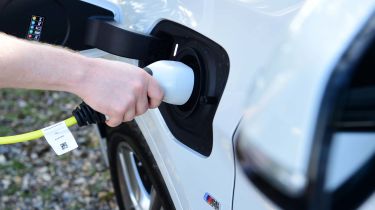BMW X1 hybrid (2019-2022) range, MPG, CO2 & charging
The BMW X1 plug-in hybrid is a match for its closest rivals when it comes to emissions, economy and electric range
| Fuel economy | CO2 emissions | Electric range | Wallbox charge time |
|---|---|---|---|
| 149-157mpg | 40-43g/km | 30-32 miles | 3hrs 30mins (0-100%, 7.4kW) |
All X1 plug-in hybrids come as standard with a five-metre Type 2 cable for use with public chargers (an option on the Volvo XC40 Recharge) and you can get an eight-metre cable at extra cost. You can also add a BMW Charging Card, or have a BP Pulse wallbox installed at your home for around £900.
BMW X1 range, MPG & CO2 emissions
With official fuel-economy figures following the usual trend for plug-in hybrids, the claimed average of around 150mpg is only likely to be attainable with a relaxed attitude to acceleration and a fully charged battery, plus plenty of pure-electric running.
Similarly, despite a claimed electric range of over 30 miles, it's safe to expect a real-life figure in the high twenties: during our short test we managed to eke out around 25 miles, which is still more than useful enough for the majority of shorter journeys in and around town. In contrast, we managed around 20 miles from the Volvo XC40 T4 Recharge, which has an official range of 28 miles. Want to go further on battery power? It might be worth waiting for the new X1, due in autumn 2022, as its plug-in powertrains are said to manage up to 55 miles of zero-emissions driving.
Claimed CO2 emissions of up to 43g/km are strong for an SUV of this type, but again will depend on your use in real life – not that it matters in the eyes of the taxman, of course. The xDrive25e is also ULEZ exempt.
Charge time
A full charge should take around five hours from a standard domestic supply, or around three and a half hours using a 7.4kW home wallbox. Charging to 80% only requires around two and a half hours. The charging port is located on the passenger side front wing and there's no rapid-charging capability.



